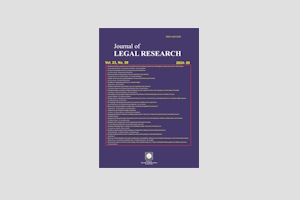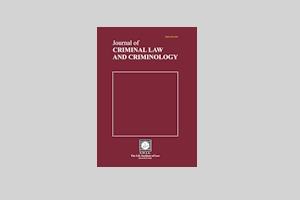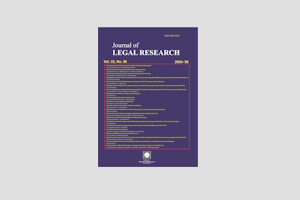Journal of
Criminal Law and Criminology
Number 10
Vol. V ● No. 2
Autumn 2017 – Winter 2018
Managing Editor: Vahid Eshtiagh
Editor-in-Chief: Mohammad Ashoori
CONTENTS
Articles
Double Criminality Rule in International Criminal Law of Iran
Masoumeh Shekofteh Gohari & Dr. Mojtaba Janipour Eskolaki
Cyber-Attacks as the Crime of Aggression and examining the Jurisdiction of International Criminal Court in its Investigations
Dr. Parastou Esmailzadeh Molabashi
Security-based Criminology and its Strategies in Process of Criminal Procedure; with an Emphasis on Criminal Law in Iran, France and The United States
Nabiollah Gholami & Dr. Shahla Moazami
The Influence of Human Rights Law on the International Criminal Regime about Death Penalty
Dr. Alireza Taghipour
Conditions of Sexual Victimization in Non-Criminal Codes (Taking into Civil Law and Law Supporting Parentless and with Bad Parents Children and Youth)
Dr. Sayed Mansour Mirsaeedi & Narges Sadat Atai Hossein Abadi
International Measures to Prevent and Combat Maritime Terrorism
Peyman Hakimzade Khoei & Dr. Mohsen Abdollahi
Articles
Double Criminality Rule in International Criminal Law of Iran
Masoumeh Shekofteh Gohari
MA in Criminal Law and Criminology, University of Guilan
&
Dr. Mojtaba Janipour Eskolaki
Assistant Professor in Criminal Law and Criminology,
Faculty of Literature and Humanities, University of Guilan
Abstract:
State-sovereignty-oriented approach has been gradually supplanted by human-being oriented approach in international criminal law. Double criminality rule is a philanthropy rule. The rule is one that is more or less uniformly applied in principle in extradition law and process on a worldwide basis. However, the particular construction differs from jurisdiction to jurisdiction, often quite considerably. The rule in some jurisdiction principles could fix some defects and criticisms. However, this rule is a serious obstacle in extradition between states. For this reason extradition replaced by some tools such as European Arrest Warrant in some countries. But improvement of process is not proven in any way. The rule on the transfer of sentenced of persons is also considered. conduct underlying the offence for which assistance is sought must a criminal offence under the laws of both States Parties regardless of whether the laws of the requested State in the same category of crime is a crime or an offense with the same word to call the requesting State.
Keywords: Double Criminality, European Arrest Warrant, Extradition, Jurisdiction, Transfer of Sentenced Persons.
Cyber-Attacks as the Crime of Aggression and examining the Jurisdiction of International Criminal Court in its Investigations
Dr. Parastou Esmailzadeh Molabashi
Ph.D. in International Law, Islamic Azad University of Najafabad and University Lecturer
Abstract:
The crime of aggression is one of the crimes that international criminal court can deal with. There is not a decisive definition about the meaning of the crime of aggression at the time of the ratification of the Rome Statute. There was an agreement between the state parties to define the crime of aggression at the time of reviewing the statute in the future. Consequently, the Crime of Aggression was being defined in 2010 under Article 8bis of the International Criminal Court Statute. Although the definition of the crime of aggression does not refer to cyber-attacks, but it seems that some kinds of these attacks according to the Rome Statute and the General Assembly Resolution 3314 of 1974, can be considered as the crime of aggression. In order to assess the cyber-attacks in the context of crime of aggression, these attacks must reach the threshold of the crime of aggression, that is to say, the most serious breach of international law regulations. For committing the crime of aggression, the perpetrators of cyber-attacks need to be aware of the circumstances that lead to the clear violation of International Law which is usually something difficult to be proven. Although some cyber-attacks can be counted as the crime of aggression, it seems that since that cyber space has its own characteristics, the best way to deal with these kinds of attacks is an agreement between states and also allocating the judges in ICC who are specialized in the field of cyberspace.
Keywords: Cyber-Attacks, Cybercrime, The Crime of Aggression, International Criminal Court, Responsibility.
Security-based Criminology and its Strategies in Process of Criminal Procedure; with an Emphasis on Criminal Law in Iran, France and The United States
Nabiollah Gholami
Ph.D. Candidate, Faculty of Law and Political Science,
Allameh Tabataba’i University, Tehran, Iran
&
Dr. Shahla Moazami
Associate Professor of Crime and Criminology, Faculty of Law and Political Science,
Tehran University, Tehran, Iran
Abstract:
Despite the creation and development of human rights movements in the last few decades, insecurity, political approaches to crime and the spread of transnational crime has caused security approach to crime and criminal law. This approach is followed particularly far-reaching impact in the field of criminal Procedure. These effects from two views, effects security-based criminology on preliminary investigation and effects security-based criminology on process of criminal procedure in courts are examinable. Iran, France and The United States, the three countries that form the laws of this approach affect in any way accepted. In this article, with study form laws and judicial procedures each of these three countries, it has been concluded that the effect of security-based criminology on process of criminal procedure in the United States, especially after the events of September 11 was much more than the Iranian and French law, French law despite strict measures of security-based approach circuit, in each case about the duties and powers of the officials and persons involved in the process of investigation has identified. In Iran Law, security-based approach in process of criminal procedure more than it is based on the letter of the law based on decisions of the authorities and judicial bodies is in the form of directives and regulations.
Keywords: Security-based Criminology, Proactive Investigate, Differential Procedure, Special Court, Officers of Justice.
The Influence of Human Rights Law on the International Criminal Regime about Death Penalty
Dr. Alireza Taghipour
Assistant Professor of Bu-Ali Sina University, Hamedan, Iran
Abstract:
The objectives of punishment are deterrence, retribution, correction of criminals and protection of the society. The designers of statute of Nuremberg and Tokyo tribunals that after Second World War established among mentioned objectives was taken into consideration only retribution. While in resolutions of Security Council of United Nations for the establishment of international tribunals for the former Yugoslavia and Rwanda all the objectives of punishment are inferential. Death penalty has not been predicted in their statutes. The reason of this can be the ratify of international documents of human rights as ICCPR and the second optional protocol of it and ECHR and annex sixth protocol of it can be named. On the other hand it can be claimed that in spite of there is no consensus in the context of death penalty prohibition in international law but the ratification of international criminal court statute by a huge number of countries in the world especially the countries that death penalty has not been prohibited in their internal regulations, represents the influence of human rights law on international criminal courts statute. But the case that can effect the impact of human rights law on statute of the international criminal court, is the possibility of retrial toward the convicted person in international criminal court by national courts that still have kept execution in their laws, so by correcting article 20(2) of statute and changing the word “crimes” to “behavior’, we will not only witness observance of human rights law of ne bis in idem, But also Status of the human rights law in prohibition of the death penalty in the statute of international criminal court will be protected in the best way.
Keywords: Death Penalty, Human Rights, International Criminal Courts, International Documents.
Conditions of Sexual Victimization in Non-Criminal Codes (Taking into Civil Law and Law Supporting Parentless and with Bad Parents Children and Youth)
Dr. Sayed Mansour Mirsaeedi
Assistant Professor of Criminal Law and Criminology and Faculty Member of
Allameh Tabataba’i University, Tehran, Iran,
&
Narges Sadat Atai Hossein Abadi
Master of Criminal Law and Criminology of Allameh Tabataba’i University, Tehran, Iran
Abstract:
To prevent sexual victimization, identifying the conditions that facilitate happening it, is important. In civil law, the legislator with stipulating the possibility of underage marriage, removing the duty of guardianship from parents while a child has an age that still needs support, removing the right of guardianship from mother just because of remarriage and the lack of foresight an effective strategy to support the child after parental separation and their remarriage, stipulating the right to punish the child by limiting it on an undefined condition “as much as punishment” and necessity of repeating out of the ordinary child battery, for the disqualification of the guardianship responsible, the lack of foresight the child neglect as a factor to remove guardianship, and in law supporting parentless and with bad parents children and youth, the legislator with acceptance of the girls and single women supervision of the girls, without foresight an effective strategy to increase these adopted child protection and to increase continued control on their living conditions, in order to ensure their safety in a vulnerable single parent’s family, and stipulating the possibility of marrying a guardian with the adopted child, provides conditions of sexual victimization, because these rules confront people with situations that are causing sexual victimization. Correction of these rules is necessary in view of the negative lifelong effects of sexual victimization.
Keywords: Victim, Sexual Victimization, Condition.
International Measures to Prevent and Combat Maritime Terrorism
Peyman Hakimzade Khoei
Ph.D. Student of Public International Law, Department of Public & International Law,
College of Law and Political Science, Science and Research Branch,
Islamic Azad University, Tehran, Iran
&
Dr. Mohsen Abdollahi
Visiting Professor, Department of Public & International Law, College of Law and Political
Science, Science and Research Branch, Islamic Azad University, Tehran, Iran
Abstract:
Terrorism is a serious threat to international peace and security. Terrorist acts in the seas and the fight against it are among the issues discussed in international law, and in particular the international law of the sea, so that the first steps in this direction dates back to the era of the League of Nations. Considering to the increasing number of terrorist acts since 1963 onward, different conventions were enacted in fighting against terrorism. Freedom of navigation depends on the security of the sea and the peace of the sea. But the terrorist acts in these vast areas have the ability to turn a tanker ship into a deadly weapon or terrorists might hijack or take the ship as hostage in direction of their political and ideological aims as what happened about Achille Lauro ship. Therefore, the international community has focused on maritime security. Numerous international measures were taken to fight against terrorist acts which look for creating a coherent structure to fight and confront with such acts in the seas. This article examines the legal developments occurring after the events of September 11th and seek to prove this proposition that the effective criminal suppression of maritime terrorism requires that this kind of terrorism is recognized as an “international crime” in international law.
Keywords: Maritime Terrorism, Fighting, Prevention, Maritime Security, International Measures.





